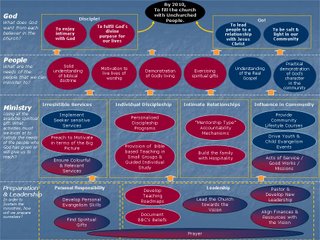Individual Discipleship
Background
I’ve said for a long time that BBC needs a “next step” process for discipleship. More and more people at BBC do not have a church background; they can’t put life in context of a solid biblical foundation. Based on the teaching over the last few years it could easily take these people 10 years to get up to speed on all of the key biblical concepts that they need to live their lives. If they attend cell group regularly this might drop to 8 years.
Apart from dying for our sins; arguably Jesus’ highest priority on earth was 12 guys who would change the world because of what the learned from him
I used to think that membership was important because we needed to bring the fringe people in. I’ve changed my mind on membership, let’s not bother about membership but focus on discipleship, instead of getting people to commit to membership of BBC, lets raise the bar and get people to commit to a process of discipleship that takes them to a new level in their Christian walk.
I used to think we should focus on the least committed people and draw them in but I’ve changed my mind, let’s focus on the most committed and help them move to a new level in their walk with Jesus, if we get this right they will take others with them.
Purpose
This process is designed to teach Christians all the key biblical concepts that they need to live lives that are worthy of their calling.
It works on the assumption that all scripture is equally inspired but not all scripture is equally relevant.
It is not about teaching theology or imparting knowledge, it is about changed lives.
At the end of the course people should know enough but more importantly be encouraged, motivated and inspired to live lives that are pleasing to God – they should also be able to help themselves when studying the bible.
Target Audience
Born again Christians who have already been baptised (not sure if this should be a pre-requisite?)
People who are convicted and committed to living lives worthy of their calling – the bar should be high this is not for people who are looking for some comfortable teaching and the fellowship of a cell group.
People who have been Christians for 1-2 years but anybody who hadn’t done the course would be welcome.
Format
Whatever will work for people? This could be self study or could be done in groups for a focussed period of time.
Every person doing the course should have a “coach” for pray, accountability and guidance during the process.
One possible format could be:
10 month course – 2 hours a week – 6:30AM to 8:30AM
20 people who commit up front for a year - 4 leaders each responsible for 4 attendees (Jan den Odens model)
Leaders are accountable to each other and meet regularly for prayer and feedback
Attendees are accountable to their leader who play’s a coaching role for them on the course.
Content
Canvas 1-4
Gods Creation
God’s plan of Salvation
Me in context of God’s plan
The Canvas of Gods plan
Defining Moments 1 & 9
Remain in God’s truth until it sets you free
Everyone will die and then judgement
Prayer & Relationship – First!
Chip Ingram on prayer
How the Holy Spirit helps us live
??
Spiritual Gifts
Mark Driscall from Marshill on spiritual gifts
God’s design for the church
Every Member ministry
Ross’s series on Ephesians
Spiritual Warfare
Waking the dead – John Eldridge
Discovering your spiritual gifts
Three Colours of Ministry
God’s world view
13:30 Sermon on the mount
God’s heart for the poor
Isaiah 58
God’s heart for the nations
OM Material?
The importance of evangelism
Go Fish 1 – 7
Where do I fit?
Living a life worthy of our calling
Adventure of living
Living Lives of Worship
The unquenchable worshiper – Matt Redmond
Motivation at the end of the course.
Other content
BBC Beliefs
Homosexuality
Women in the church
The Holy Spirit
Baptism
Key Theology
???
Marriage
If we are married, being a good Husband / Wife is absolutely key to living a God honouring life
Parenting
If we have children, being a good Father / Mother is absolutely key to living a God honouring life
What the bible says about money
Wherever your heart is that’s where your money is too
LO$T – from North point
Brief overview of the bible
Whistle stop tour of the bible.
Read or listen to the whole bible over the duration of the course

